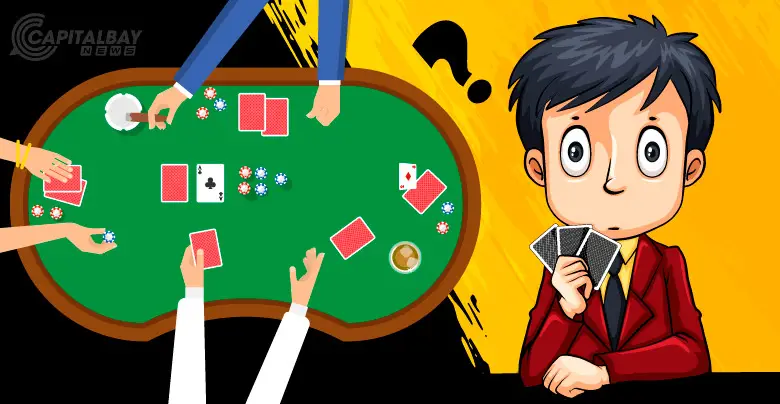What Does it Mean to Fold in Poker?

Folding is a move that ends the participation act in the poker game. By laying down cards on the table, They withdraw their hand when it is their turn to take action in the betting rounds, and the player no longer has a call on the pot.
In most poker games, fold action is returning the player cards to the dealer who places them in the muck. This doesn’t cause gaining or losing any additional money by the player. Once a fold is done, the player cannot re-raise their hand; this is also known as lay down or muck.
Introduction
The fact, losing the hand in the game, may seem like a tough choice to make because when a player drops the hand, he loses claim on bets made by bettors and the amount placed previously in bet, will be considered as dead money. But, mucking according to the strategy is also their top skill.
Likewise, not following the poker rules and folding or a preflop without proper checking is considered rude poker etiquette. When one chooses to end their part, the player must also think of opponents who are still in the play.
What Happens When You Fold?
To fold doesn’t always mean to lose, as the popular poker rooms’ saying goes – ‘you got to know when to hold and when to fold them’. The key to winning at the poker room is to hold the right cards and spot losses and profit costs.  When one chooses to fold, it does not merely mean to drop their hand or cards; it means to lose the claim on buy-ins and tons of other options in the rest of the game as they can’t re-raise their hand. Though it is tough, to play aggressively without tracking the bet’s nature, proper win-rate info may row a chance of raising a flop and wager nothing of value.
When one chooses to fold, it does not merely mean to drop their hand or cards; it means to lose the claim on buy-ins and tons of other options in the rest of the game as they can’t re-raise their hand. Though it is tough, to play aggressively without tracking the bet’s nature, proper win-rate info may row a chance of raising a flop and wager nothing of value.
Things a person must take into account before laying down the cards or fold them are-
- Fold without Bluff – One must place the fold without bluff, following the course of showdown but not at the mere sight of the weak hand. Folding often affects the player’s long term win-rate at poker game tournaments.
- Understand the Data – One must understand the data and situation, decide when to drop the hand, and make sure it is not done a lot of times but only at the right point of time to cut post flop damage.
- Reduce Pre-Flop – Playing against a lot of hands and pairing of two hole cards might be tricky, but one must be mindful of folds made and study actions of people, calls of raises, and mindset of the opponent. The strategy to reduce post-flop loss is to play tight and reduce pre-flop mistake folding.
What is folding in poker?
The terms and requirements for folding are easy to follow. The basic idea of everyone at tables is to have the highest hand for a longer run. However, the situation might not be favorable for someone.
Here are different reasons for fold: When Player A at the tournament raises a hand or bet in a way Player B and Player C at the board could not match it, they fold their hands, and Player A is the winner of the pot. This is common practice to steal the blinds pre-flop. And there are always spots left to bet on something; the difference is the option of the player’s path to rule out the case of losing more than placed. If everyone at the poker table folds their hand, the person in front of them automatically wins without doing anything.
How to Fold?
The basic poker rule states that, the process to fold is to wait until their turn and lay down cards without revealing them to others. If a participant places upcards, the others in the session have information about cards, dead and alive, which usually results in a game breach. However, when you are playing on an online poker website or web casino sites, you can use the author code to program action.  The standard poker guideline is to place the cards face down and slide them forward to the dealer so that the stack of cards are raked to muck pile.
The standard poker guideline is to place the cards face down and slide them forward to the dealer so that the stack of cards are raked to muck pile.
However, in a live game, you have to be verbal before folding. For example, the participant must say “I fold” to the dealer before placing them on the table.
When to Fold?
The poker players are classified into three types:
- One who folds too often
- One who folds too less
- One who folds right
An average poker player tends to fall in the tags – too often or too less and rarely into the last thing. Many poker articles and poker players worldwide have listed articles with content examples based on their experience and suggested that the key is to pay attention preflop, navigate around the number of playing hands.
Do not fold too much as it makes you vulnerable. Do not deviate in the middle but deviate the opponent instead. Keep an eye out on declarations made, like if the opposite participant at the poker table had paid for a pair of odds of flush and called out of the position, they may have a reason.
When to Show Folded Cards?
 According to poker laws, in certain variants such as 7 card stud poker, the upcards are slided down to the dealer, who places them in muck. This is often considered against the definition since it interferes with gameplay.
According to poker laws, in certain variants such as 7 card stud poker, the upcards are slided down to the dealer, who places them in muck. This is often considered against the definition since it interferes with gameplay.
Generally, all cards are turned in facing down, but if a participant suspects someone at the table has seen the card under all rights reserved to the participant- “show one, show all” the dealer is obligated to show everyone the cards.
Conclusion
Every contestant hopes to win the highest stakes, and this might be easy in poker rollouts, like the one on Saturday, September 26, 2020. However, the key to being successful at poker is to play right with accurate hand selections, calling on the right bets so that the issue of loss is limited. The strategy is to figure a losing hand and to fold right, for a profitable play.



